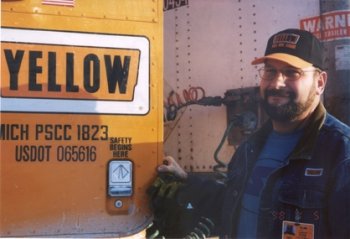When Eastern Territory Grand Lodge Representative
Karl Heim and his son Eric crossed into Mexico to visit the
infamous Maquiladoras region in July of 2002, they did not
expect to be back six months later, trying to get a truckload of
donated clothing past armed and obstinate Mexican border guards.
Nor did they expect border-crossing lessons from a pair of
union-friendly nuns of the aptly named Servants of the Eleventh
Hour. "The trip did not go exactly as we planned," said Heim
upon his return. "But we found unexpected help every step of the
way."
The goodwill odyssey began with a trip arranged by Professor
Harley Shaiken of the University of California, Berkley. Shaiken
and the Center for Latin American Studies regularly escort
eye-opening expeditions to the so-called free trade capital of
Mexico for lawmakers, union leaders and business officials.
"The sight of Mexican workers living with their families in
cardboard boxes is hard to imagine and difficult to describe,
but it is impossible to forget," said Shaiken. "This is where
free trade rhetoric meets real world reality."
The initial trip made a strong impression on 19-year old Eric
Heim. "I wanted to do something to help," said Eric. "These
people have so little. It wouldn't take much to make a big
difference."
The instinct to help stayed with Eric all the way back home
to Michigan.
With assistance from friends and fellow students at Macomb
County College, Eric created "Hands Across the World," a
non-profit foundation to collect and deliver donated clothing
for desperately poor workers and their families in Tijuana.
By December 5, the Heim household was overflowing with nearly
a half-ton of clean, folded clothing ready to make the
2,400-mile trip to Mexico. With truck space provided by Yellow
Freight, Inc., the international mercy mission was on its way.
"We flew to San Diego to meet our truck when it arrived on
Dec. 10," said Eric.
"Once it got there, we moved the clothing into a smaller
truck. All that was left was the one-hour trip to the border. Or
so we thought."
"Most people cross the U.S.-Mexico border without any
problems," said Karl Heim, who accompanied his son on the second
journey. "Our truck, however, drew immediate attention from
border guards who did not want us to cross," said Heim. "You
can't bring donated goods into Mexico," declared one guard who
said the only place we could cross was Laredo, Texas, more than
1,300 miles away!
"Nothing we said to the guard about how desperately this
clothing was needed seemed to make any difference," said Karl
Heim. "It was hard to understand what the problem was. But
clearly, we had a problem.
"We were almost ready to give up when Sister Carmen, one of
two nuns making the trip with us from San Diego motioned us to
her," said Heim. "Follow me," she whispered. "We know how to get
these things done."
Sister Carmen and Sister Olivia are part of the unusual 11th
Hour religious order founded last year and ministering to a
flock that includes orphans, cancer patients and convicts in
Mexico's toughest prisons. They specialize in collecting donated
goods throughout San Diego and coordinating delivery across the
border.
It was with their help that the Heim's began the first of ten
problem-free trips across the border in a car loaded down each
time with clothing, shoes and goodwill that came all the way
from Michigan.
By the end of two very long days, every last bag of clothing
was across the border and delivered to families whose need was
as great as their gratitude. "It was an arduous journey that
concluded as a resounding success," said Karl.
"Next time," said Eric Heim, who plans to keep the "Hands
Across the World" foundation active, "I think even more clothes,
some furniture and maybe a truckload of food would be a good
idea."

Yellow Freight Company provided a tractor-trailer to haul the
donated goods from Michigan to San Diego. "These young
people ― what they did
― it just makes you feel good," said
Yellow Freight's driver before starting the 2,400 mile trip.